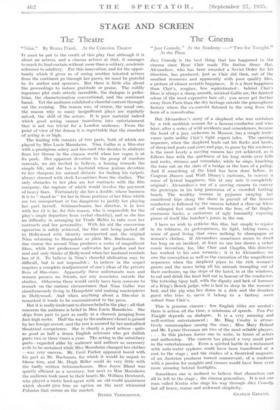STAGE AND SCREEN The Theatre
• "Nina." By Bruno Frank. At the Criterion Theatre IT must be put to the credit of this play that although it is about an actress, and a cinema actress at that, it manages to reach its final curtain without more than a solitary, academic reference to adultery. For this innovation, and for the oppor- tunity which it gives us of seeing another talented actress from the continent go through her paces, we must be grateful to, its author and sponsors. But there is little else about the proceedings to induce gratitude or praise. The mildly ingenious plot ends utterly incredible, the dialogue is pedes- trian, the characterisation conventional, and the sentiment banal. Yet the audience exhibited a cheerful content through- out the evening. The reason was, of course, the usual one, the reason why so many insignificant plays are regularly salved, the skill of the actors. It is poor material' indeed which good acting cannot transform into entertainment that is not too trivial for a London audience. From the point of view of the drama it is regrettable that the standard of acting is so high.
The leading role consists of two parts, both of which are played by Miss Lucie Mannheim. Nina Gallas is a film-star with a prodigious salary and fan-mail who decides to abdicate from her throne in the cinema world when her vogue is at its peak. Her apparent devotion to the pomp of stardom conceals, we are invited to believe, a leaning towards the simple life, and she has a husband whose jealous devotion to her sharpens his natural distaste for finding his carpets always strewed with sleek Levantines from the studios. The only obstacles to her plan are her contracts with the film. company, the rupture of which would involve the payment of heavy fines. Fortunately she has a double, whose business it is to " stand in " for her in those portions of her films which are too unimportant or too dangerous to justify her playing her part herself. SchimineImann, her director, is in love with her (it is he, for this reason, who is responsible for the play's single departure from verbal chastity), and so she has no difficulty in arranging for Trude Melitz to take over her contracts and her personality. With his aid the conversion operation is safely achieved, the film unit being packed off to Hollywood with identity unsuspected and the original Nina returning to Hampshire as plain Mrs. Buchanan. In due course the second Nina produces a series of magnificent films, while her predecessor cultivates her garden and her soul and only thinks of Hollywood when her husband reminds her of it. To believe in Nina's cheerful abdication may be difficult, but is not impossible ; to believe in the sequel requires a complete readjustment of one's ideas of the private lives of film-stars. Apparently these unfortunate men and Women possess no friends, nor any associates outside the studios. Otherwise there would surely have been someone to remark on the 'curious circumstance that Nina Gallas was simultaneously living in Hampshire and making masterpieces in Hollywood. And when anything about a film-star is remarked it tends to be communicated to the press.
But it is really irrelevant to discuss belief in the play ; all that concerns the audience is belief in Miss Lucie Mannheim. She skips from part to part as easily as a chamois jumping from foot-high rocks. Half the way to the audience's heart is gained by her foreign accent, and the rest is assured by her undoubted theatrical competence. She is clearly a good actress—quite as good as half a dozen English actresses who get dullish parts two or three times a year. Tke acting in the subsidiary parts—regarded alike by audience and authors as necessary evils to be sustained while Miss Mannheim changed her clothes —was very uneven. Mr. Cecil Parker appeared bored with his part as Mr. Buchanan, for which it would be unjust to blame him, and Mr. Hugh Miller could do very little with the badly written Schimmelmann. Miss Joyce Bland was quietly efficient as a secretary, but next to Miss Mannheim the audience took most to their hearts Mr. William Dewhurst, who played a rustic land-agent with an old-world quaintness which should give him an option on the next whimsical Polonius that comes on the market.
DEREK VERSCIIOYLE.














































 Previous page
Previous page